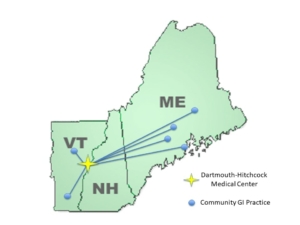
In January 2020, Helmsley announced a grant of $593,736 to Dartmouth-Hitchcock to improve access to specialty care for people living with Crohn’s disease across northern New England. This grant enables Dartmouth-Hitchcock to expand its current telemedicine program for Inflammatory Bowel Disease (IBD) by creating a Virtual IBD Center. We spoke with Dartmouth-Hitchcock’s Section Chief of Gastroenterology and Hepatology, Dr. Corey A. Siegel, to learn more about how this grant will increase the quality of telemedicine care for those living with IBD.
Dr. Siegel: People often think of telemedicine as a patient and a provider meeting on a video call, providing care, and moving on, but in reality the potential for telemedicine is much greater than that. This grant allows us to expand for care to be provided by our entire team and provide the full services of our IBD Center. This means that in addition to a gastroenterologist who is an IBD specialist, we will have a team that includes a Crohn’s disease nurse coordinator, psychologist, dietician, and a pharmacist. This ability is uniquely important for patients with Crohn’s disease – it’s not just about going to see your doctor or receiving primary care, but about a holistic approach that cares for every aspect of someone with Crohn’s disease.
To be successful in managing patients with Crohn’s disease we want to be proactive, follow up regularly, and stay on top of things until a patient is in remission. Although we all know that this is important, from a practical standpoint it is very hard to be good at this without having an excellent team to support the process. This grant allows us to do that.
Dr. Siegel: There are a few parts to this process. First is the clinical part: we are currently getting ready to ramp up our accessibility and availability by convening our team and connecting with partner sites in northern New England. The key component of this program is our ability to work with other sites as teammates to provide the greatest care possible. The second part is increasing our understanding about the effectiveness of our program. The research component of this project will allow us to collect data to study the impact of our program on the quality of care we delivery to patients and their disease outcomes.
Dr. Siegel: I think of this program as being made up of concentric circles. In the first circle, we are starting with a small group to test out this model. We want to be sure that the community gastroenterologists and larger team are supported, and this trial allows us to understand what does and does not work. The second circle is a larger group of practices in northern New England. We want to be able to expand this program to reach patients who do not have access to specialists in their areas. Finally, we hope to expand even further through our hub and spoke model. Whether Dartmouth-Hitchcock is the main hub and we expand our community to include other “spokes,” or other centers see our model and choose to duplicate it, we hope this can serve as a model for other geographic or practice areas.

In addition, we hope that more providers and patients understand the many benefits of telemedicine. Beyond providing excellent care, another benefit is the decreased costs. We have learned in pilot work that patients spend a lot of out-of-pocket money just going to the doctor’s office. Especially for those in rural areas who need to travel far to receive care, they incur additional costs paying for gas, child care, taking time off work, and staying overnight. With telemedicine, these costs will be eliminated, and there will be less of a burden on the healthcare system.
Furthermore, in areas where patients live far away from specialists, they often go to the emergency department or get admitted to the hospital unnecessarily when something is wrong. When patients have telemedicine readily available, they will be able to speak to someone about the symptoms they are experiencing and provide care, as opposed to receiving emergency care from doctors who don’t know them, in addition to having to cover the costs of an ambulance and the visit.
Dr. Siegel: While this program was conceptualized before the pandemic, the timing and coincidence is remarkable. For those who have already been interested in telemedicine, this has been a small silver lining because now more patients and providers are realizing the importance and effectiveness of telemedicine. The pandemic has certainly impacted how we deliver care to our patients. Patients have a lot of fear, and are often avoiding going out to public places, especially the doctor’s office where there are other sick people around. Delaying necessary care for their Crohn’s disease can have long-term implications. One aspect of having Crohn’s disease or ulcerative colitis is having routine care that can prevent complications. Many are at risk for neglecting this because they do not want to go to the doctor, which means that we may see a “second wave” of illness that is not COVID-19, but flares and complications of Crohn’s disease. Telemedicine allows us to provide both urgent care and that routine preventative care so patients can stay healthy while also staying home.
I have done 100+ telemedicine visits in the last few weeks, and every single one of them has ended with patients asking about their risk for COVID-19. It is on everybody’s minds. Through having these telemedicine appointments, even if I didn’t do anything for their disease, we were able to discuss their risk related to IBD and COVID-19, which can decrease their anxiety and allow them to take a breath and have some reassurance, which ultimately benefits their health.